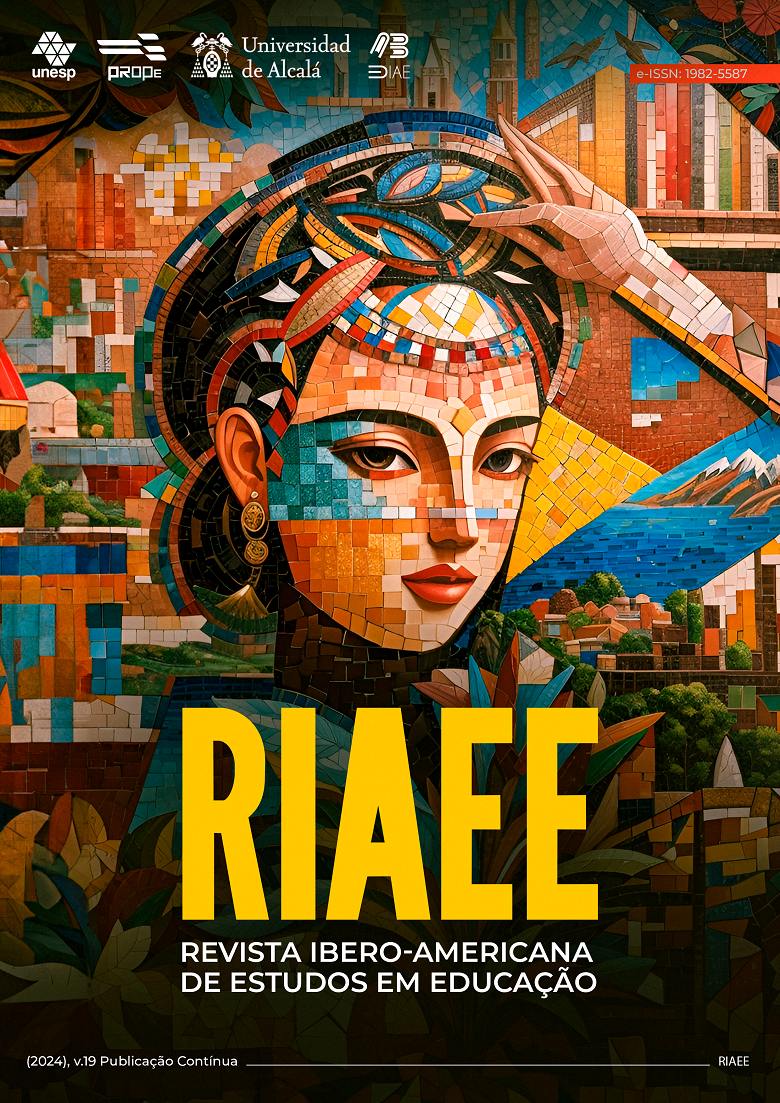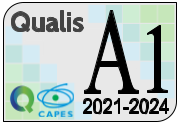CONSTRUÇÃO E EVIDÊNCIAS DE VALIDADE DA ESCALA DE AUTORREGULAÇÃO NO PLANEJAMENTO E MANEJO DE AULA NO ENSINO SUPERIOR
DOI:
https://doi.org/10.21723/riaee.v19i00.18231Palavras-chave:
Avaliação, Ensino e aprendizagem, Ensino superior, Autorregulação, Teoria social cognitivaResumo
Esta pesquisa criou e validou uma escala (AR-PLCO) para avaliar a autorregulação de indivíduos quanto ao planejamento e condução de aulas, baseando-se na aprendizagem autorregulada. Foi utilizada uma metodologia de pesquisa exploratória aplicada e de natureza quantitativa que envolveu 283 respondentes do Brasil, com diferentes níveis de pós-graduação. Juízes participaram visando encontrar evidências de validade. As análises de dados foram descritiva, evidência de validade baseada no conteúdo, análises fatoriais exploratórias e confirmatórias, confiabilidade e precisão. Foram encontrados valores satisfatórios para a confiabilidade, forte correlação com a escala de autoeficácia docente, evidência de validade baseada no conteúdo e estruturas internas. A escala AR-PLCO pode ser usada como um instrumento de pré-pós avaliação para estruturar programas de formação de professores do ensino superior.
Downloads
Referências
ABENGE. National Commision for Engineering New Guidelines Implementation. 2023. Disponível em: http://www.abenge.org.br/dcn_2019.php. Acesso em: 10 mar. 2023.
AERA-APA-NCME. Standards for educational and psychological testing. Washington, DC: American Educational Research Association, 240 p, 2014.
AMIRIAN, S. M. R. et al. The contribution of critical thinking and self-efficacy beliefs to teaching style preferences in higher education. Journal of Applied Research in Higher Education, [S. l.], v. 15, n. 3, p. 745-761, 2023.
ASCE. The Vision of Civil Engineering in 2025. 2007. Disponível em: http://www.asce.org/uploadedFiles/About_Civil_Engineering/Content_Pieces/vision2025.pdf. Acesso em: 10 nov. 2018.
ASCE. Civil Engineering Body of Knowledge for the 21st Century-Preparing the Civil Engineer for the Future. 2008. Disponível em: https://www.asce.org/uploadedFiles/Education_and_Careers/Body_of_Knowledge/Content_Pieces/body-of-knowledge.pdf. Acesso em: 10 nov. 2018.
BANDURA, A.; CERVONE, D. Social Cognitive Theory: an Agentic Perspective on Human Nature. Wiley, 2023.
BISHOP, D. What are metrics good for? Reflections on the Research Excellence Framework (REF) and Teaching Excellence Framework (TEF). [S. l.: s. n.], 2018. v. 24.
BROADBENT, J. et al.The self-regulation for learning online (SRL-O) questionnaire. Metacognition and Learning, [S. l.], 2022.
CLEARY, T. J. et al. Professional development in self-regulated learning: Shifts and variations in teacher outcomes and approaches to implementation. Teaching and Teacher Education, [S. l.], v. 111, p. 103619, 2022.
CLEARY, T. J.; LABUHN, A. S. Application of cyclical self-regulation interventions in science-based contexts. In: ZIMMERMAN, B. J. et al. (ed.). Applications of self-regulated learning across diverse disciplines: a tribute to Barry J. Zimmerman. Charlotte, North Carolina: Information Age Publishing, 2013. cap. 4, p. 89-124.
COHEN, J. A power primer. Psychological Bulletin, [S. l.], v. 112, n. 1, p. 155-159, 1992.
DENG, J. et al. Delving into the relationship between teacher emotion regulation, self-efficacy, engagement, and anger: a focus on English as a foreign language teachers. Frontiers in Psychology, [S. l.], v. 13, p. 17, 2022.
DORNAN, T. et al. Experience based learning (ExBL): clinical teaching for the twenty-first century. Medical Teacher, [S. l.], v. 41, p. 1-8, 2019.
EESC-USP. Avaliação Capes - Conceito Máximo. 2022. Disponível em: https://eesc.usp.br/ppgs/sel/post.php?guid=avaliacao-capes&catid=apresentacao. Acesso em: 10 Set. 2018.
ENGLAND, R. et al. Research Excellenjce Framework 2021. 2021. Disponível em: https://www.ref.ac.uk/. Acesso em: 27 Jan. 2021.
EVANS, T. M. et al. Evidence for a mental health crisis in graduate education. Nature Biotechnology, [S. l.], v. 36, n. 3, p. 282-284, 2018.
FERNANDES, F. Universidade brasileira: reforma ou revolução? 1. ed. São Paulo: Expressão Popular, 2020.
GUERRIERO, I. C. Z.; MINAYO, M. C. A aprovação da Resolução CNS nº 510/2016 é um avanço para a ciência brasileira. Saúde e Sociedade, [S. l.], v. 28, 2019.
HAN, F.; VACULÍKOVÁ, J.; JUKLOVÁ, K. The relations between Czech undergraduates’ motivation and emotion in self-regulated learning, learning engagement, and academic success in blended course designs: consistency between theory-driven and data-driven approaches. Frontiers in Psychology, [S. l.], v. 13, 2022.
HEEKIN, E. Teaching Excellence Framework (TEF): the ratings in full 2019. Disponível em: https://www.theuniguide.co.uk/advice/choosing-a-course/teaching-excellence-framework-tef-the-ratings-in-full. Acesso em: 27 jan. 2021.
INNOVATION, E. C. R. Research & Innovatin: germany analysis. 2018. Disponível em: https://rio.jrc.ec.europa.eu/en/country-analysis/Germany. Acesso em: 10 set. 2018.
JANSEN, R. S. et al. Self-regulated learning partially mediates the effect of self-regulated learning interventions on achievement in higher education: a meta-analysis. Educational Research Review, [S. l.], 2019.
KARAGIANNIS, S. The conflicts between science research and teaching in higher education: an academic's perspective. International Journal of Teaching and Learning in Higher Education, [S. l.], v. 21, n. 1, p. 75-83, 2009.
KIRAN, D. Examining the efficacy change of preservice science teachers: does an inquiry-based laboratory instruction make a difference? A mixed method study. International Journal of Science Education, [S. l.], v. 44, n. 9, p. 1527-1548, 2022.
KIZILCEC, R. F.; PÉREZ-SANAGUSTÍN, M.; MALDONADO, J. J. Self-regulated learning strategies predict learner behavior and goal attainment in Massive Open Online Courses. Computers & Education, [S. l.], v. 104, p. 18-33, 2017.
KLINE, M.; KLINE, P. M. E. C. I. M. S. M. Why the Professor Can't Teach: mathematics and the dilemma of University Education. St. Martin's Press, 1977.
LI, K. MOOC learners’ demographics, self-regulated learning strategy, perceived learning and satisfaction: A structural equation modeling approach. Computers & Education, [S. l.], v. 132, n. 1, p. 16-30, 2019.
MARSH, H. W. Application of confirmatory factor analysis and structural equation modeling in sport and exercise psychology. Handbook of Sport Psychology, 2007. p. 774-798.
MCMASTER, U. Problem based learning. Canada, 2023. Disponível em: https://fhshrwelcome.mcmaster.ca/did_you_know/problem-based-learning/. Acesso em: 10 mar. 2023.
MICKWITZ, A.; SUOJALA, M. Learner autonomy, self-regulation skills and self-efficacy beliefs – How can students’ academic writing skills be supported? Language Learning in Higher Education, [S. l.], v. 10, p. 381-402, 2020.
PANADERO, E. A Review of Self-regulated Learning: six models and four directions for research. Frontiers in psychology, [S. l.], v. 8, p. 422-422, 2017.
PANADERO, E. et al. Using formative assessment to influence self- and co-regulated learning: the role of evaluative judgement. European Journal of Psychology of Education, [S. l.], v. 34, n. 3, p. 535-557, 2019.
PISANTI, R.; SORACI, P.; SCHWARZER, R. The italian version of the teacher self efficacy scale (TSES-Ita): dimensionality, internal consistency and validity. Journal of Psychoeducational Assessment, [S. l.], v. 41, n. 2, p. 234-243, 2023.
POLYDORO, S. et al. Escala de auto-eficácia docente de educação física. In: MACHADO, C. E. C. (ed.). Avaliação psicológica: formas e contextos. [S. l.: s. n.], 2004. , v. 10, p. 330-337.
RUSSELL, J. M. et al. Fostering self-regulated learning in higher education: making self-regulation visible. Active Learning in Higher Education. Sage Journals, [S. l.], p. 97-113, 2022.
SCHMIDT, M.; HANSSON, E. Doctoral students’ well-being: a literature review. International Journal of Qualitative Studies on Health and Well-being, [S. l.], v.13, n. 1, p. 1508171, 2018.
SCHUNK, D. H. Social cognitive theory. In: SCHUNK, D. H. (ed.). Learning theories: an educational perspective. [S. l.]: Pearson Education, 2012. cap. 4, p. 117-162.
SCHUNK, D. H.; PAJARES, F. Self-efficacy theory. In: WENTZEL, K. et al. (ed.). Handbook of Motivation at School: New York, NY: Routledge, 2009. cap. 3, p. 35-53.
SCHUNK, D. H.; USHER, E. L. Barry Zimmerman’s theory of self-regulated learning. In: ZIMMERMAN, B. J. et al. (ed.). Applications of self-regulated learning across diverse disciplines: a tribute to Barry J. Zimmerman. Charlotte, North Carolina: Information Age Publishing, 2013.
SEROW, R. C. Research and Teaching at a Research University. [S. l.]: Springerplus, 2000. p. 449-463.
SILVEIRA, A. A.; NASCIMENTO, C. M. A crítica de Florestan Fernandes à reforma universitária e sua atualidade. Revista Em Pauta. R.J.: Revista da Faculdade de Serviço Social da Universidade do Estado do Rio de Janeiro, 2016.
SOCIETY, P. TEF vs REF: are teaching and research now adversaries? [S. l.]: The Physiological Society, 2016.
STEBBINS, R. A. Exploratory research in the social sciences. [S. l.]: SAGE Publications, 2001.
THIENGO, L. C.; BIANCHETTI, L. Educação superior no âmbito do BRICS: aspiração à excelência? Educação Unisinos, [S. l.], v. 23, n. 3, p. 488-504, 2019.
TOE, D. M.; LONGARETTI, L. Teacher efficacy in high performing teachers: barriers and enablers for new graduates. Australian Journal of Teacher Education, [S. l.], v. 47, n. 4, p. 1-20, 2022.
TRUONG, T. N. N. Psychometric properties of self-regulated learning strategies in learning English Grammar and English Grammar Self-Efficacy Scales. Frontiers in Education, [S. l.], v. 7, 2022.
TSCHANNEN-MORAN, M.; HOY, A. W. Teacher efficacy: capturing an elusive construct. Teaching and Teacher Education, [S. l.], v. 17, n. 7, p. 783-805, 2001.
UNESCO. UNESCO Education Strategy 2014–2021. 2014. Disponível em: http://unesdoc.unesco.org/images/0023/002312/231288e.pdf. Acesso em: 23 jun. 2023.
XIA, Y.; YANG, Y. RMSEA, CFI, and TLI in structural equation modeling with ordered categorical data: The story they tell depends on the estimation methods. Behavior Research Methods, [S. l.], v. 51, n. 1, p. 409-428, 2019.
ZIMMERMAN, B. J. Theories of self-regulated learning and academic achievement: An overview and analysis. In: ZIMMERMAN, B. J.; SCHUNK, D. H. (ed.). Self-regulated learning and academic achievement: theoretical perspectives. Mahwah, N.J: Lawrence Erlbaum Associates Publishers, 2001. p. 1-37.
ZIMMERMAN, B. J. Attaining self-regulation: a social cognitive perspective. In: BOEKAERTS, M. P.; PAUL R.; ZEIDER, M. (ed.). Handbook of self-regulation. San Diego, Calif.: Academic Press, 2005. cap. 2, p. 13-39.
Downloads
Arquivos adicionais
Publicado
Como Citar
Edição
Seção
Licença
Copyright (c) 2024 José Carlos Redaelli, Soely Aparecida Jorge Polydoro, Tiago Zenker Gireli

Este trabalho está licenciado sob uma licença Creative Commons Attribution 4.0 International License.
Manuscritos aceitos e publicados são de propriedade dos autores com gestão da Ibero-American Journal of Studies in Education. É proibida a submissão total ou parcial do manuscrito a qualquer outro periódico. A responsabilidade pelo conteúdo dos artigos é exclusiva dos autores. A tradução para outro idioma é proibida sem a permissão por escrito do Editor ouvido pelo Comitê Editorial Científico.








